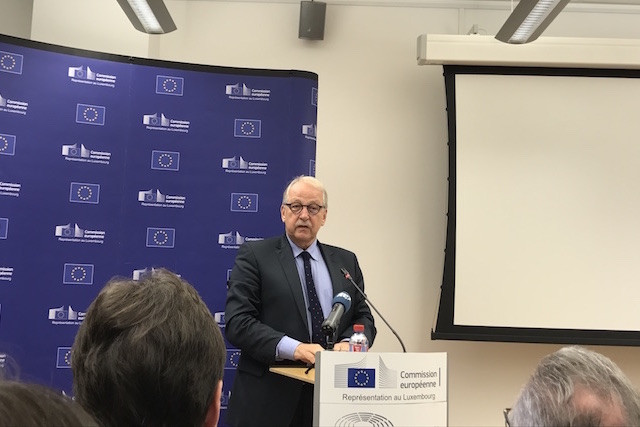Matthias Ruete and Yuriko Backes spoke at the talk, which was organised by the European Commission and held at the European Information Centre in Luxembourg-Centre on Monday 9 October.
Yuriko Backes, head of the European Commission representative office in Luxembourg opened the conference, anticipating the tone of the event in her introduction, as she characterised the conference as a contribution to the timely debate on the growing numbers of migrants.
Backes named some of the past and future projects of the European Commission, including the amendment of the Dublin Regulation, the improvement of legal migration routes as well as the necessity of a plan on how to cooperate with Turkey.
In terms of the relocation scheme that was introduced in 2016, Backes noted that Luxembourg made a significant contribution and praised the grand duchy for being “a star pupil”.
Matthias Ruete, general director of the migration and home affairs department at the European Commission, took a step back in time. He explained that Jean-Claude Juncker, the commission president, re-prioritised migration during his term.
According to Ruete, the Lampedusa ship wreck in 2015 significantly catalysed the commission’s involvement in the crisis. Ruete outlined the five key pillars initiated by the European Commission.
Border protection
The protection of borders was mentioned as a first pillar which has been reinforced with the establishment of Frontex, the European border and coast guard agency. In addition, checks on people crossing European borders were boosted. Ruete noted that the commission aimed to introduce a border control scheme based on biometric information which would closely resemble the American system.
Human protection
The protection of people was a second pillar, “less repressive” than the first protection pillar, in Ruete’s view. It was vital for the commission to rework the Dublin Regulation as it did not spell out in detail how to manage in a crisis. Ruete also noted that the relocation and resettlement system had been introduced to foster a governance system based on solidarity and sharing between European member states.
When questioned whether Europe would favour people with high qualifications, Ruete emphasised that this was a misunderstanding and that, in general, the commission supported people in need of protection.
Circular migration
A third pillar addressed return policies, which according to Ruete, are still a work in progress. In his view, it is vital “to create a return department” to pro-actively allow people to resettle in their countries of origin. The significance of “circular migration” scheme is pertinent in his opinion as “there are very few migrants who do not want to return home.”
Yuriko Backes of the European Commission (on left) during the “Migration vs solidarity” conference in Luxembourg City on 9 October 2017, with Matthias Ruete, also of the European Commission, at the panel table on the right. Staff photo.
Attraction and integration
The two last pillars were about Europe’s attraction of highly qualified workers and researchers, and about integration politics of the individual member states. However, Ruete noted that this equally applied to seasonal workers.
When asked whether it was possible that an imbalance within Europe could emerge from the differences between African and European development, Ruete explained that migration was concomitant with the gross domestic product of a country.
In addition, the commission needed to work on visionary politics: by identifying which jobs will be in demand in Africa in 15 years, they could adapt the European job market and thereby support circular migration politics.

